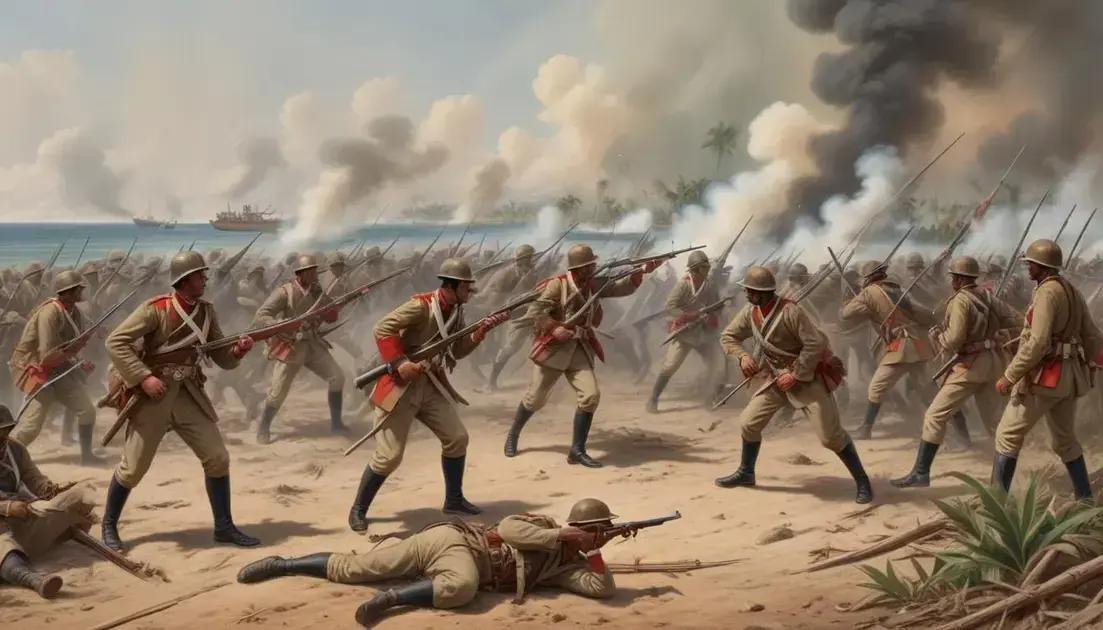
The Anglo-Zanzibar War: The Shortest War in History Lasted 38 Minutes
The Anglo-Zanzibar War, fought on August 27, 1896, is known as the shortest war in history, lasting only 38 minutes. This conflict arose from tensions between the British Empire and Sultan Khalid of Zanzibar, who resisted British control. Following a swift bombardment of the Sultan’s palace, Khalid’s forces were overwhelmed, leading to his exile and the installation of a pro-British sultan. The war had significant repercussions, illustrating the dynamics of colonial power and leaving a lasting impact on Zanzibar’s future.
Imagine a war that started and ended before you finished your breakfast. On August 27, 1896, the Zanzibar War broke out between the British Empire and Zanzibar, lasting only 38 minutes!
The Context of the War
To understand the Zanzibar War, we need to look at the history leading up to it. The late 19th century was a time of fierce competition among European powers for colonies in Africa. The British Empire was expanding its reach, and control over Zanzibar was crucial for trade routes.
Zanzibar, a group of islands off the coast of Africa, was ruled by Sultan Hamad bin Thuwaini. He had close ties with the British, which made other regional powers uneasy. However, in 1896, the Sultan died, and the new ruler, Sultan Khalid, had different ideas. He wanted to resist British influence.
This tension led to rising conflicts between Khalid’s forces and the British. Their relationship quickly soured, igniting a power struggle. The British were determined to assert their control. The situation escalated fast, setting the stage for war.
On August 27, 1896, the British issued an ultimatum to Sultan Khalid. They demanded he step down or face consequences. Khalid refused to give in, and this decision sparked the infamous war. It was a classic example of imperial ambitions clashing with local resistance.
This conflict was not just about a territory; it represented the broader struggle for power during the colonial era. The world was watching as two sides prepared for battle.
The Key Events
The Zanzibar War was quick, but several key events shaped its outcome. It all started on the morning of August 27, 1896. The British issued an ultimatum to Sultan Khalid. They demanded he step down by 9 a.m.
Khalid refused to leave his throne. This decision set the stage for a short but intense conflict. At 9:02 a.m., British warships began bombarding the palace. The shells exploded, causing chaos in the city.
Despite having a small force, Khalid’s army fought back fiercely. They used artillery and small arms to defend their position. However, they were outmatched. The British had superior firepower and better tactics.
By 9:30 a.m., the palace was in ruins. Many of Khalid’s soldiers were either killed or captured. He soon realized the battle was lost. The British were in control, and the war was effectively over.
The conflict lasted only 38 minutes, marking it as the shortest war in history. In the aftermath, Sultan Khalid fled to the German consulate for safety. The British installed a puppet sultan who favored their interests, ensuring continued control over Zanzibar.
The Aftermath and Impact
The aftermath of the Zanzibar War was significant and far-reaching. After the swift victory, the British established a new sultan. This new leader was more friendly to British interests. Thus, Zanzibar became a protectorate of the British Empire.
This change affected the local population. Many Zanzibaris felt uneasy with foreign rule. The local economy was heavily influenced by British trade policies. While some traders benefited, others struggled to survive.
Furthermore, the war showcased the power dynamics of the time. It highlighted how quickly imperial ambitions could unfold. The quick defeat of Sultan Khalid served as a warning to other nations considering resistance.
Though brief, the conflict left a lasting mark on history. The Zanzibar War remains a symbol of colonialism’s impact. It serves as a clear example of how imperial powers operated.
In the years following the war, Zanzibar played a pivotal role in trade. Its strategic location made it valuable for maritime routes. This continued British control eventually led to more significant political movements in the region.
Conclusion
In conclusion, the Zanzibar War is a fascinating yet brief chapter in history. It reveals how quickly imperial ambitions could change a region. The war not only reshaped Zanzibar but also highlighted the dynamics of colonial power. Understanding this event helps us see the impact of imperialism on local cultures and economies.
The aftermath of the war continued to affect the lives of Zanzibaris. With the British in control, trade and politics shifted significantly. This conflict serves as a key example of how colonial powers operated during that time. It reminds us that history often has lessons about power, resistance, and the consequences of war.


